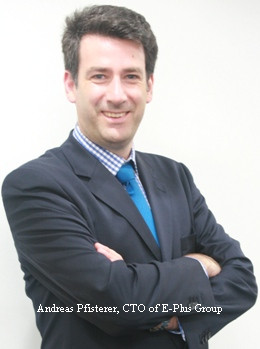E-Plus: Moving from Voice-Centric to Data-Centric Growth
 E-Plus is the third-largest network operator in Germany in terms of customer base. Since launching its network in 1994, E-Plus has provided customer-focused innovation time and time again. E-Plus has rocked both the residential and commercial sectors with flat rates, and discounted telephone and data services. ZTE Technologies recently interviewed Andreas Pfisterer, CTO of E-Plus Group. He talked about E-Plus’s challenge, LTE deployments in Germany, and future cooperation with ZTE.
E-Plus is the third-largest network operator in Germany in terms of customer base. Since launching its network in 1994, E-Plus has provided customer-focused innovation time and time again. E-Plus has rocked both the residential and commercial sectors with flat rates, and discounted telephone and data services. ZTE Technologies recently interviewed Andreas Pfisterer, CTO of E-Plus Group. He talked about E-Plus’s challenge, LTE deployments in Germany, and future cooperation with ZTE.
Q: Can you introduce E-Plus and its main business focus?
A: E-Plus is a mobile operator in Germany with more than 25 million customers. Our focus is predominantly residential customers, and we like all customers to experience the full capacity and capabilities of our network. Last year, we launched a high-speed network for everybody at no additional cost.
Q: What are characteristics of the Germany telecom market and what are some challenges that E-Plus faces?
A: Germany is a very competitive market. We have four main operators: E-Plus, O2, Vodafone and Deutsch Telecom. Prices and revenues have come down predominantly in voice and SMS primarily because of migration but also because of competition. One reason for this trend is regulation on pricing and the other is cannibalization by OTT players, who have taken away a lot of revenue. On the flip side, we have also seen increasing revenue from data. So it is a very challenging market environment. The challenge lies in monetizing data to compensate for the decline in revenue from traditional voice and SMS.
Q: What is the key to E-Plus’s sustainable growth and development?
A: The key challenge is to move from voice-centric growth to data-centric growth and to manage investment at the same time. We invested sensibly into our networks and into the market. We have moved from voice-centric to data-centric growth by offering very attractive prices to our customers. This means that we also have to be the leader in terms of pricing and make sure we offer excellent value for money.
Q: What do you think about LTE deployment in Germany?
A: Compared to other markets, such as Hong Kong, Singapore, and Korea, LTE penetration has only been gradual in Germany. This is basically because 3G and HSPA+ was the focus of last year. To be honest, from a customer’s perspective, the underlying technology is not of foremost concern, particularly when you can get top speeds of 50 Mbps or 100 Mbps. You can provide good customer experience using existing technology. For us, LTE is pretty much a technology offering additional capacity that not many others can offer. We believe we can monetize it from the customer’s perspective, so we offer it at no additional cost wherever and whenever needed. We are now gradually rolling out LTE, and in those areas where we see a necessity in terms of capacity, we provide it to our end customers.
Q: How is the LTE network performing and what still needs to be done to expand LTE coverage?
A: The LTE network we are rolling out on 1800 MHz is performing very well. We will gradually expand the network wherever and whenever necessary. It’s also a part of our investment strategy to invest the right technology at the right time. We implement our strategy in cooperation with ZTE, one of our major partners who is helping us roll out our future data network. We will continue to gradually expand the network in line with customer expectations and data usage.
Q: What do you think of ZTE as a strategic partner? Where do you think ZTE could improve?
A: We have been working with ZTE for a very long time, and now we are gradually expanding our partnership with ZTE. Last year, we expanded the partnership by involving ZTE in our managed services. ZTE is also our preferred partner in our program to roll out a data network for the future. We chose ZTE because they have a similar market approach to us: they are a challenger in the market and have the same beliefs. We have similar DNA so to speak. I think we can always improve by becoming more flexible and reducing the time to market for rollout and service delivery. We collaborate with ZTE in these areas.
Q: What do you expect from future cooperation with ZTE?
A: We are prepared to extend the partnership with ZTE. We have partnered with ZTE in order to satisfy increased demand for data services and quality of experience. We are very happy to have come so far with ZTE and we will continue to work with them.
Q: What are the key factors for this sustainable relationship?
A: First, we have to have sensible priorities. I think we have established a solid foundation that ensures win-win situation for both ZTE and E-Plus. Second, you really need to work as partners. This means you share your risks and benefits and support each other in face of different challenges. The two parties have to go in that way. ZTE had not previously handled managed services at such scale, and it is also challenging for E-Plus to maintain cost leadership in the market and attract customers through low prices and value for money. Being a strategic partner means that you share the risks and benefits in the partnership.